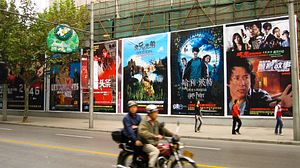The vanguard of the Chinese science fiction revolution and one of the most innovative science fiction novels in modern times won a Hugo Award and has been read by Barack Obama and Mark Zuckerberg. So, to put it rather bluntly, why do so many think the Three Body Problem movie is going to suck?
Well, there were CGI arguments, censorship concerns, a relatively inexperienced director, a year and a half in post-production, and a preponderance of production complications. But, despite all this, there is genuine hope that China can work its newfound respect in the world of literary science fiction into success at the box office and, perhaps more importantly, respect from critics abroad.
There is perhaps no greater force in contemporary international literature than Chinese science fiction: Liu Cixin’s Hugo was followed by Hao Jingfang’s Folding Beijing, and inimitable writers like Ken Liu act as translator in both language and form for the fine art of future imagined by the mainland. The recent Invisible Planets features the finest in Chinese science fiction writers, from the dysfunctional depth of Chen Qiufan to Ma Boyang’s terse, systematic storytelling. So, upon this rock, shall China’s movie industry build its church?
Well, not yet. In December Liu Cixin told The Guardian that people were looking at his books to become the “new Star Wars,” but he was quick to point out: “But personally I feel that such an expectation for the first attempt of the nation’s film industry might be unrealistic. I’d rather watch this process unfold with a calm attitude, treating it like a positive start for China’s sci-fi films.”
Three Body Problem is a start, and while hopes might not be exactly high for a movie that’s still being played with a year and a half after completed filming in August 2015, fans of Chinese cinema have every reason to be optimistic. China’s film industry faces the unique position of being forced to choose between big budget success at home — which can be found in the critical flops of Warcraft and Great Wall — and the dream of building a movie empire abroad on growing talent of Chinese science fiction literature.
“We hope the movie will trigger a huge transformation in the whole Chinese movie market,” Lin Qi, CEO of Yoozoo Pictures, said in November 2016, going on to boast that the movie is expected to contain more than 1,700 special effect shots.
Wang Jianlin has been putting the might of Dalian Wanda to the task of creating a Chinese Hollywood for years now, and the prospect of China’s first sci-fi blockbuster in Three Body Problem means Qingdao could be bearish on domestic science fiction. For now, however, the plan seems to be foreign films with Chinese characteristics — as in infrastructure. The Russo brothers were tipped for a big budget Chinese-language film earlier in 2016 and Legendary Entertainment’s Godzilla and Pacific Rim 2 are already planned for shooting in Wang Jianlin’s Qingdao filming hub. Despite its worldwide acclaim, Chinese literary sci-fi will have to wait behind the makers of Captain America.
Doubts remain as to whether all of these plaudits, awards, and expectations can be realized by China’s beleaguered film industry, but it has to be giving filmmakers and producers hope that, despite all the guff and gripes, Three Body Problem the movie is sure to make money — even if it’s just RMB.













